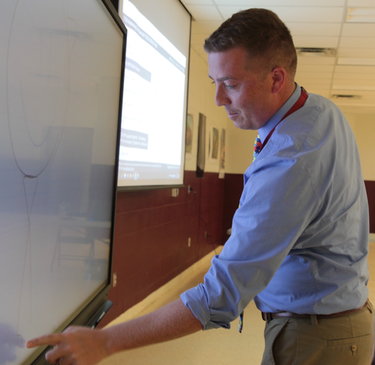BKW sets stage for 2021-22 school year at reorg meeting
HILLTOWNS — The Berne-Knox-Westerlo School District is ramping up for the new school year, the looks of which are still murky due to a lack of guidance from government officials.
While the board of education waits to find out whether it will be able to welcome all its students back for continuous in-person schooling and probes the Hilltown community for how to handle flexible mask policies, it held its reorganizational meeting on July 14, welcoming new board member Lisa Joslin, who replaced Randy Bashwinger after an uncontested election.
In unanimous votes, the board also named Matthew Tedeschi as board president and Kimberly Lovell as vice-president. Tedeschi, who was first elected to the board in 2016 and has served as president once already, is taking over for Nathan Elble, who still sits on the board.
Spending plan
Under Tedeschi, and flanked by Superintendent Timothy Mundell, the board of education will oversee the transition into post-pandemic education, the most immediate aspect of which is the expenditure of more than $1.5 million in federal funds over the next few years, through September, 2024.
On July 1, Mundell published the district’s plan for spending the money, which is earmarked by the federal government for COVID-related expenses, digital access, extended learning and enrichment programs, and various other uses. Twenty percent of the total must be put toward learning loss mitigation.
“The three-year plan is meant to be fluid and amendments are allowed every six months,” Mundell wrote in a statement announcing the plan. “As such, we anticipate that amendments will likely occur as we implement programs, review each program’s impact on student learning and engagement and revise as necessary.”
The plan is broad, multi-faceted and, as Mundell notes, subject to change, but areas of expenditure as it stands now include: air-filtration system improvements, new bus-routing software, increasing internet accessibility and connectivity, increasing the number of meal opportunities for students, new educational technology hardwares and softwares, extracurricular activities, remediation programs, academic intervention services in the elementary school, and “professional development targeted to enhance early literacy and play based learning.”
As part of the plan, the school board last month appointed BKW English teacher Bonnie Kane to a three-year special assignment as College and Career Readiness Coordinator, with the basic mission of increasing career awareness among students.
The board also appointed Bill Dergosits, currently an elementary school teacher, to the technology education department, where he’ll help redesign technology education for fifth- through eighth-grade students to “focus on gaming, coding, and robotics.”
Dergosits brought electronic sports, esports, to the district in early 2020 when he began a video-game program at the school as a way to engage students with their passions, particularly those who are part of what’s known as the “hidden demographic,” meaning they don’t participate in traditional extracurricular activities like sports and music.
Critical race theory
At the reorganizational meeting, Mundell briefly addressed another major issue that came to the fore last year when he responded to a parent who wanted to know how the board felt about critical race theory.
As Mundell explained to those attending the meeting, critical race theory has its roots in legal scholarship dating back to the 1970s, when intellectuals were exploring racism as it exists deep in American institutions, as opposed to out in the open, particularly in social contexts.
It’s an idea that has, in many ways, already suffused popular understanding of racism (even if it hasn’t necessarily affected praxes), all the more so following the murder of George Floyd, a Black man, in May 2020 by a white police officer, which prompted worldwide outrage and renewed discussion around issues involving race.
Lately, though, it’s come under attack by primarily conservative pundits and politicians who argue that it casts unfair aspersions on white people, who, under critical race theory, are seen as the primary beneficiaries of racist systems.
According to the Brookings Institution, seven states have passed laws that effectively ban critical race theory from curricula, although not explicitly in most cases, likely because critical race theory isn’t a concrete worldview so much as it is a lens, meaning that two practitioners using it as a mode of thought to explore a topic won’t necessarily come out with the same conclusions.
Instead, the states banned “the discussion, training, and/or orientation that the U.S. is inherently racist as well as any discussions about conscious and unconscious bias, privilege, discrimination, and oppression,” according to Brookings. “These parameters also extend beyond race to include gender lectures and discussions.”
At the July 14 meeting, Mundell said, in essence, that, although critical race theory will not be formally included in the school’s curriculum, BKW educators are responsible for creating equity among students to the best of their ability, giving the analogy of a restaurant buffet offering unlimited quantities to all diners, each of whom will take differing amounts according to their need.
“Diversity can mean many things beyond race,” Mundell told The Enterprise in an email last summer. “We have all walked a different path in life and we each have different stories. Whether male or female, rich or poor, young or old, black/white/brown, learning challenged or extremely bright, straight/gay/bi/trans we are all human.
“When we each understand the other,” he said, “we can be a more whole being and help others to fulfill their potential as well. We are on a journey to support this process as a means to creating not only an equitable school system, but a just society.”


